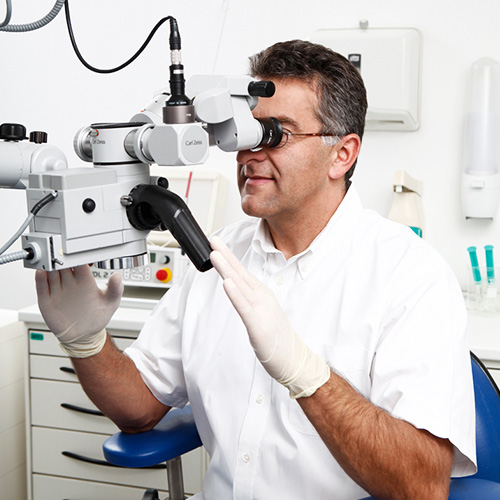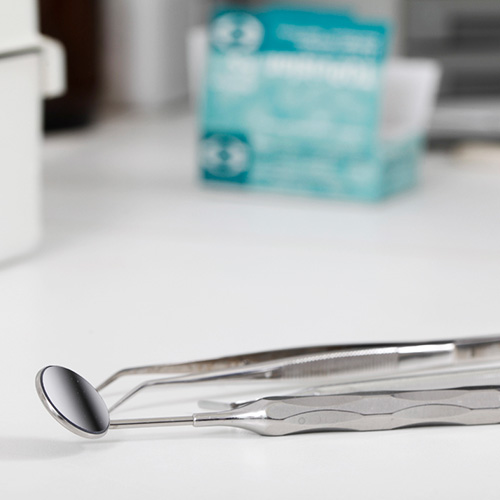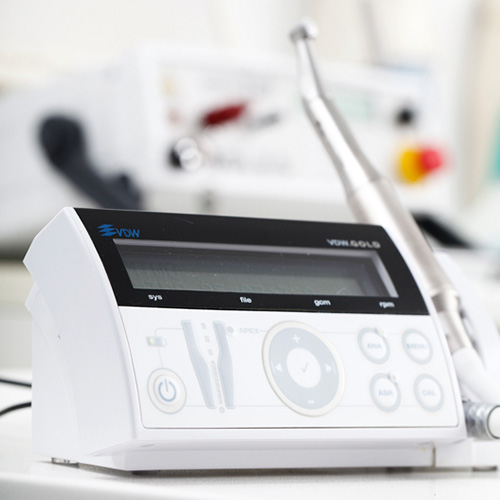Our practice has specialised exclusively in root canal treatments since 1993
In addition to offering state-of-the-art technology and maintaining rigorous quality standards, our priorities include punctual treatment for our patients without time pressure.
Our aim is to provide you with the highest quality of care while saving and retaining your tooth. We place great importance on creating a peaceful and positive atmosphere and providing warm and empathetic care during your treatment. Our goal is your wellbeing!
Endodontic therapy (root canal therapy)
The most frequent reason for endodontic therapy is an infection of the tissue in the interior of the tooth (pulp), causes of which may include caries or loose or broken fillings. Endodontic treatment involves opening the interior of the tooth under local anaesthetic.
Bacteria and tissue fragments are then removed from the root canal system and its branches. Conventional methods usually reach only part of this system; a microscope can be used to identify lateral canals and calcified or atypically routed canal systems which can then be freed from bacteria and diseased tissue.
The chambers are cleaned, expanded, disinfected and sealed with special filling material (gutta-percha). The tooth is then sealed with a filling.
Endodontic retreatment (root canal retreatment)
Endodontic retreatment is necessary if a previous root canal treatment has been unsuccessful. This often happens in the case of incompletely filled or infected root canals. In root canal retreatment the filling in place is removed and the canal system is completely cleaned and disinfected once again.
Frequently asked questions
1. What are the benefits of endodontic treatment?
This treatment can save teeth that would otherwise have to be extracted. Teeth treated in this way can basically be regarded as healthy teeth with a few minor considerations.
2. What alternatives are there to endodontic treatment?
The only alternative is to extract the tooth altogether. However, this may in turn cause problems such as tooth migration, bone loss, changes in occlusal position, cosmetic problems or more complex prosthetic solutions.
3. Are all teeth suitable for endodontic treatment?
A few cases are unsuitable for endodontic treatment – such as cases where there is no access to the root canal, where the root canal condition does not allow for thorough cleaning and filling, or a tooth is not considered salvageable owing to additional problems like periodontitis or extensive destruction or decay.
4. Is endodontic treatment painful?
Treatment takes place under local anaesthetic and is typically completely pain-free.
5. Does pain occur after treatment?
The process of cleaning and filling the root canals may cause irritation in the surrounding tissue for one or two days after treatment, leading to sensitivity particularly in biting down. However, ordinary painkillers are generally sufficient to manage the pain.
6. How many treatments are necessary?
If the tooth is still alive at the time of treatment, one appointment is generally enough. However, two or three appointments may be needed depending on the extent of infection.
7. How long does the treatment take?
The first treatment generally takes one hour for a front tooth and around one and a half to two hours for side teeth. Further treatment sessions take around one hour.
8. Are further appointments necessary after conclusion of the treatment?
After root canal treatment your dentist will generally seal the tooth with a full or partial crown. The tooth should be examined after around six months by us or by your own dentist.
9. Does the tooth discolour after root canal treatment?
This is no longer the case with modern treatment methods, since causes of discoloration (e.g. residual tissue) are completely removed under the microscop
10. What does root canal treatment cost?
Costs of treatment depend on the number of canals in the tooth, on whether multiple treatments are necessary and whether the patient seeks initial treatment or retreatment. For more precise information, we advise patients to arrange a brief consultation or submit X-rays.
For more information see
http://de.wikipedia.org/wiki/ Wurzelkanalbehandlung



